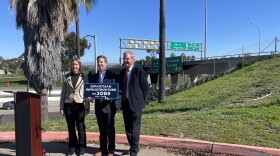A year after the California State University Board of Trustees ordered a systemwide audit of the Title IX process at all 23 campuses, the full report was published on Monday.
The report also included individual assessments and recommendations for each of the campuses, including San Diego State University.
In the 61-page report, the law firm Cozen O’Connor said SDSU’s Center for the Prevention of Harassment and Discrimination (CPHD) lacks the “infrastructure required” and is “under resourced” to carry out all of its functions.
Resources at SDSU for sexual assault victims
• SDSU Counseling & Psychological Services: (619) 594-5220 (non-emergency)
• Counseling Access & Crisis Line: (888) 724-7240, www.sa.sdsu.edu/cps/
• Student Health Services, Calpulli Center: (619) 594-5281, shs.sdsu.edu/index.asp
• SDSU Police Department: (619) 594-1991
• Center for Community Solutions: (888) 385-4657 (bilingual rape crisis hotline), ccssd.org
The center is responsible for responding to Title IX violations, including sexual assault and harassment.
Christy Heiskala, a sexual assault survivor advocate at the law firm Haeggquist & Eck, said the report was not anything that people don't already know. Though she said it was upsetting that the university did not fill a survivor advocate position for several months after the previous one left.
“They mentioned that the people that work there don't necessarily understand what the victim advocate has to offer, what support resources they have to offer for the students," Heiskala said. "And I find that very common.”
The lack of resources was cited, in part, as the reason for the trust gap among students. The report noted that at the time of the audit, the school was under public scrutiny for its handling of the sexual assault allegations involving the football team.
Leslie Gomez, vice-chair of the Institutional Response Group at Cozen O’Connor, said the lack of resources often leads to inferences of institutional bias — or the need to protect the institution instead of the victim.
“To say that more concisely, where there was a gap between the institutions, commitment to do the right thing and their ability to be carried out because of resources, that gap got filled by negative inference,” she said.
Gomez said case workers truly want to help survivors but don't have enough resources.
The report said SDSU should do more to increase awareness of what CPHD does and the resources available. Gomez said the issue isn’t unique to SDSU but a part of a pattern across the entire CSU system.
Gina Maisto Smith, chair of the Institutional Response Group at Cozen O’Connor, said the complex and dense Title IX reporting process also has a negative effect on assault survivors.
“It necessarily takes time," she said. "And the impact of the time on those individuals was a very difficult thing to hear over and over again.”
Solving the resource issue, however, will take time. In an email to faculty and staff, SDSU president Adela de la Torre said the university had already hired a reporting compliance specialist and is in the process of hiring a confidential administrative assistant and another survivor advocate.
She also said SDSU has convened a team to review the report's recommendations.
KPBS is a broadcast service of San Diego State University.






